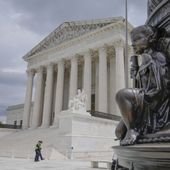3:15 p.m.
SEOUL, South Korea (AP) — North Korea faced global condemnation and calls for harsh sanctions today after it announced that it had set off an atomic explosion underground, a test that thrusts the secretive communist state into the elite club of nuclear-armed nations.
The United States, Japan, China and Britain led a united chorus of criticism, with President Bush saying the reported test poses a threat to global peace and security, and “deserves an immediate response” by the U.N. Security Council, which met to discuss the crisis.
Mr. Bush said he had called the leaders of South Korea, China, Russia and Japan, and all had reaffirmed a commitment to a nuclear-free Korean peninsula.
The reported test came one day after the ninth anniversary of reclusive North Korean leader Kim Jong Il’s accession to power.
Members of the 15-nation Security Council were unanimous in denouncing the claim amid worldwide concern that it could seriously destabilize the region, with even North Korean ally China saying it strongly opposed to the move.
“No one defended it, no one even came close to defending it,” U.S. Ambassador John Bolton said. “I was very impressed by the unanimity of the council … on the need for a strong and swift answer to what everyone agreed amounted to a threat to international peace and security.”
The Security Council had warned the impoverished and isolated nation just two days earlier not to go through with a test, and Mr. Bolton said Washington will seek U.N. sanctions to curb North Korea’s import and export of material for weapons of mass destruction, as well as its illicit financial activities.
Mr. Bolton and key U.S. allies, including Britain and France, said they would seek a resolution under Chapter 7 of the U.N. Charter that would seek punishing measures, going beyond the limited sanctions in a measure adopted by the council in July after North Korea conducted seven missile tests.
Chapter 7 grants the council the authority to impose a range of measures including breaking diplomatic ties, imposing economic and military action.
The Bush administration repeatedly has said it has no plans to invade North Korea and military action appeared unlikely. But the U.S. proposed stringent U.N. sanctions today, including a trade ban on military and luxury items, the power to inspect all cargo entering or leaving the country, and freezing assets connected with Pyongyang’s weapons programs, according to a copy of the draft obtained by The Associated Press.
North Korea’s U.N. ambassador Pak Gil Yon said the Security Council should congratulate his country instead of passing “useless” resolutions or statements.
Iranian state radio, meanwhile, blamed North Korea’s reported nuclear test on U.S. pressure, saying the test “was a reaction to America’s threats and humiliation.”
Iran has said it will not abandon uranium enrichment despite the threat of international sanctions over its disputed nuclear program, which Tehran insists is purely for peaceful purposes.
Mr. Bush said the United States was still attempting to confirm that a nuclear test had actually taken place. Still, he said, “such a claim itself constitutes a threat to international peace and security.”
A U.S. government official, who spoke on condition of anonymity because of the political sensitivity of the situation, said the seismic event could have been a nuclear explosion, but its small size was making it difficult for authorities to pin down.
South Korea’s National Intelligence Service chief Kim Seung-kyu reportedly told lawmakers signs of suspicious movement were spotted at another suspected test site.
The current members of the nuclear club are the United States, Russia, Britain, France, India, Pakistan and China. Israel is widely believed to have the bomb but has not publicly declared.
Reports about the size of the explosion were conflicting. Only Russia said the blast was a nuclear explosion but the reaction of world governments reflected little doubt that they were treating the announcement as fact.
“We have no doubts that it (the test) was nuclear,” Russian Defense Minister Sergei Ivanov said.
The Russian Foreign Ministry summoned Pyongyang’s ambassador to Russia, demanding that North Korea “immediately take steps to return to the regime of the Nuclear Nonproliferation Treaty” and to the six-nation talks.
South Korea’s geological institute estimated the force of the explosion to be equivalent to 550 tons of TNT, far smaller than the two nuclear bombs the U.S. dropped on Japan in World War II.
The head of South Korea’s spy agency said the blast was equal to less than 1,000 tons of TNT, the South Korean Yonhap news agency reported.
France’s atomic energy commission similarly estimated the blast measured at around 1 kiloton or less - equivalent to the explosive force of 1,000 tons of TNT.
Ivanov said it was far more powerful, equivalent to 5,000 to 15,000 tons of TNT.
The U.S. Geological Survey said it recorded a magnitude 4.2 seismic event in northeastern North Korea. Asian neighbors also said they registered a seismic event, and an official of South Korea’s monitoring center said the magnitude 3.6 tremor wasn’t a natural occurrence.
Japan dispatched three aircraft to waters between Japan and the Korean peninsula to monitor radiation levels, the Defense Agency said. Russia reported no increase in radiation levels in its Primorye territory, which borders North Korea.
Nuclear blasts give off clear seismic signatures that differentiate them from other explosions, said Friedrich Steinhaeusler, a professor of physics at Salzburg University. Even if the bomb the North Koreans detonated was small, sensors in South Korea would likely be close enough to categorize the explosion as nuclear, he said.
“I think we have to take them at their word. They’re not the type of regime to bluff,” said Peter Beck, Seoul-based analyst for conflict resolution think tank International Crisis Group.



Please read our comment policy before commenting.